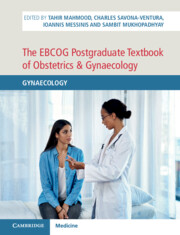Book contents
- The EBCOG Postgraduate Textbook of Obstetrics & Gynaecology
- The EBCOG Postgraduate Textbook of Obstetrics & Gynaecology
- Copyright page
- Dedication
- Contents
- Videos
- Contributors
- Preface
- Section 1 Basic Sciences in Gynaecology
- Section 2 Menstrual Disorders
- Section 3 Reproductive Endocrinology and Infertility
- Section 4 Contraception and STIs
- Section 5 Post-Reproductive Care
- Section 6 Vulva and Vagina
- Section 7 Cervix
- Section 8 Uterus
- Section 9 Ovary and Fallopian Tubes
- Chapter 37 Childhood Ovarian Cancers
- Chapter 38 Benign and Borderline Ovarian Tumours
- Chapter 39 Non-epithelial Ovarian Cancers
- Chapter 40 Diagnosis of Epithelial Ovarian, Fallopian Tubal and Peritoneal Surface Cancers
- Chapter 41 Treatment of Epithelial Ovarian Cancers, Fallopian Tube Cancers and Peritoneal Surface Cancers
- Chapter 42 Benign Breast Disorders
- Section 10 Operative Gynaecology
- Section 11 Public Health Issues in Gynaecology
- Section 12 Miscellaneous
- Index
- Plate Section (PDF Only)
- References
Chapter 41 - Treatment of Epithelial Ovarian Cancers, Fallopian Tube Cancers and Peritoneal Surface Cancers
from Section 9 - Ovary and Fallopian Tubes
Published online by Cambridge University Press: 24 November 2021
- The EBCOG Postgraduate Textbook of Obstetrics & Gynaecology
- The EBCOG Postgraduate Textbook of Obstetrics & Gynaecology
- Copyright page
- Dedication
- Contents
- Videos
- Contributors
- Preface
- Section 1 Basic Sciences in Gynaecology
- Section 2 Menstrual Disorders
- Section 3 Reproductive Endocrinology and Infertility
- Section 4 Contraception and STIs
- Section 5 Post-Reproductive Care
- Section 6 Vulva and Vagina
- Section 7 Cervix
- Section 8 Uterus
- Section 9 Ovary and Fallopian Tubes
- Chapter 37 Childhood Ovarian Cancers
- Chapter 38 Benign and Borderline Ovarian Tumours
- Chapter 39 Non-epithelial Ovarian Cancers
- Chapter 40 Diagnosis of Epithelial Ovarian, Fallopian Tubal and Peritoneal Surface Cancers
- Chapter 41 Treatment of Epithelial Ovarian Cancers, Fallopian Tube Cancers and Peritoneal Surface Cancers
- Chapter 42 Benign Breast Disorders
- Section 10 Operative Gynaecology
- Section 11 Public Health Issues in Gynaecology
- Section 12 Miscellaneous
- Index
- Plate Section (PDF Only)
- References
Summary
Epithelial ovarian cancer is currently still treated with chemotherapy using carboplatin and paclitaxel in a 3-weekly regimen. Maintenance treatment is started, using targeted therapy with anti-VEGF bevacizumab or PARP inhibitor olaparib. In the recurrent setting the classical platinum-resistant or -sensitive cut-off has loosened and these days time to next subsequent treatment is increasingly used. New drugs are being investigated in ovarian cancer, mainly CDK4/5 inhibitors and checkpoint inhibitors.
- Type
- Chapter
- Information
- The EBCOG Postgraduate Textbook of Obstetrics & GynaecologyGynaecology, pp. 357 - 365Publisher: Cambridge University PressPrint publication year: 2021



